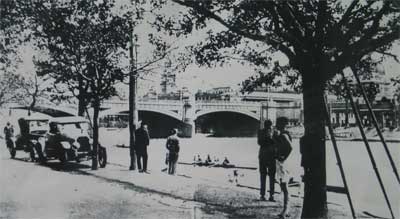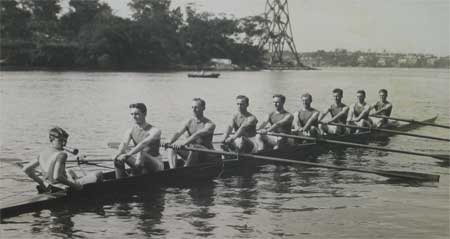History of Mercantile Rowing Club
Table of Contents
Chapters
- The River Yarra
- Early Rowing in Victoria
- The Beginnings (1880-1890)
- Mercantile in the Nineties (1890-1900)
- Sloan, Ivens and Fluctuating Fortunes (1900-1910)
- Dark Days and New Dawn (1910-1920)
- Years of Mixed Success (1920-1930)
- Through the Thirties (1930-1939)
- The Struggle for Survival (1939-1946)
- Building for Success (1946-1950)
- Mercantile to the Melbourne Olympics (1950-1956)
- Rowing to Rome (1956-1960)
- A Pink Cloud on the Horizon (1960-1965)
- The Storm and its Passing (1965-1966)
- A Clear Light Blue Sky (1966-1968)
- High Noon (1968-1970)
- A New Challenge (1970-1973)
- Fire and the Second Building Project (1973)
- Winds of Change (1973-1976)
- The Close of the Century (1976-1980)
- The Base for Success (1980-1984)
- Success (1984-1988)
- Oarsome Foursome (1988-1992)
- A Boathouse for the Best (1992-1996)
- The Rise of the Professional Coach (1996-2000)
- Golden Girls (2000-2005)
Appendices
7. Years of Mixed Success (1920-1930)
By the start of the 1920-21 season, memories of the disastrous conflict of 1914-18 were gradually diminishing. There were few Australian families who had not been directly affected by the death or wounding of relatives and friends. Demobilisation of the returning forces had taken place and, with a shortage of labour and relative affluence, the community appeared anxious to make up for the lost years of the Great European War. The jazz age had arrived and Australians were to enjoy nearly a decade of artificial prosperity before they were to face the realities of the Great Depression in 1929.

The scene outside Mercantile in the 1920s.
In the rowing sphere, many oarsmen of pre-war years had returned to the club. A number took up office from the members who had kept the club afloat during the difficult times of the preceding years. Mercantile also had recruited well during the latter years of the war and, despite an increase in senior subscription to £2.12.6, membership stood at 103 at the start of the season. Accordingly, with a blend of youth, experience and the promising regatta results of 1919-20, the club looked forward to a new era of prosperity in the years to come.
Ted Kenny, who originally came from the Leichhardt Rowing Club in N.S.W. in the early 1900's, was again captain. He was also secretary of the Victorian Rowing Association and of the Australian Henley Regatta. Jack Mounsey, a prominent pre-war junior oarsman, who had been decorated for valour while serving in France, and who was a nephew of the redoubtable Alex Sloan, had succeeded Jud Harding as vice-captain and Frank Betts had assumed the position of secretary. As was to be the case for many years to come, Stephen Morell and Alec Clarke continued as the club's president and treasurer respectively.
Alex Sloan again had become senior coach of the club and the new decade opened with immediate success at Henley, when the Junior Eight, stroked by Jim Buchanan, won the Founders Challenge Cup. The club's representatives in the Senior Fours at this regatta were defeated in their heat by a crew from the then famous South Australian club of Murray Bridge, but with one change were successful in the Champion Fours rowed two weeks later. This was the club's first win in this event for 14 years and it is interesting to note that the victorious crew of 1906 was stroked by Alex Sloan, who coached the 1920 crew, which was stroked by Jack Mounsey.
At the Melbourne Regatta of 1920, the Senior Eight stroked by Jim Buchanan, won the Morell Cup for the second successive year by the narrow margin of two feet, with this being the club's only winning crew from the club's seven entries. Although no wins were recorded at the Christmas Regattas, the Senior Four was successful at the Upper Yarra Regatta over the January holiday weekend.
With Jack Mounsey as stroke, the Senior Eight was unsuccessful at the Ballarat and Barwon double, but following a number of seating changes the crew was only narrowly defeated in the Champion Eight rowed two weeks later. As an indication of the rapid revival of the popularity of rowing following the war, this event attracted a record entry of 10 crews. After two false starts the large field got away perfectly and a splendid race resulted in a win for Civil Service, who snatched victory from Mercantile by two feet in the last few strokes. The SS "Rosny" was engaged to follow the race, which was rowed from Williamstown Ferry to Footscray, and the demand for tickets was so great that many applications had to be refused.
Bob Gregg, Jud Harding and Jim Buchanan were selected for the Interstate Eight, with the latter having to decline for business reasons. The Victorian crew could finish only third to Western Australia, who then scored their first win in the Australian Eight Oared Championship. This was to be the last time the Interstate Eight Oared Championship was conducted without the prestige of the King's Cup being attached to it. At the Interstate conference of the previous year, it was decided to approach the Defence Department with a view to securing the King's Cup as a perpetual trophy for the Interstate Event. This trophy had been won by the A.I.F. No. 1 Crew, stroked by Dr. Clive Disher, at the Henley Peace Regatta in England in 1919 and was destined for the Australian War Museum. The original request and subsequent approaches met with a flat refusal by the Australian authorities and eventually the Victorian Rowing Association prepared a petition to the King which was signed by Dr. Disher. This set out the facts and asked that His Majesty make known his wishes concerning the disposal of the trophy. On May 13, 1921, a reply was received from the Secretary of State for the Colonies (Mr. Winston S. Churchill) stating that "His Majesty commands me to inform you that it is his wish that the Cup should used as a permanent trophy, and be competed for annually in the Interstate Eight Oared Race of Australia." Thus the Interstate Eight became as from 1922 a competition for the King's Cup.
It is interesting to note that at the same time, the question was raised of reducing the Interstate Eight to two miles and that all delegates were opposed to the change. It was to be almost 40 years before a permanent reduction to the present 2000 metres was achieved.
By the end of the 1920-21 season membership had reached a record level of 147, with 55 new members being elected during the year. This was reflected in the club's finances, which showed a surplus of over £99 for the year. The capital of the club had increased to £2,127 with the boathouse being valued at £1,250 and boats and oars at £680. In addition to its War Loan Bond of £100 the club had a healthy bank balance of £167.
The racing fleet, depleted during the war years, comprised one Best Eight, two Best Fours, one Clinker Eight, two Clinker Fours, two Pairs and one Scull. The practice fleet comprised three Eights, three Fours, two Pairs and two Sculls. In addition, orders had been placed for three new practice fours at a total cost of £135, together with three sets of oars. These new boats were subsequently to be named N. Johnston, J. W. Cumberland and N. C. Nation, in memory of the three members of the club's successful Junior Eight at Henley of 1914 who had been killed in action.
In the Premierships of 1920-21, Mercantile was second to Civil Service in the Senior pennant and third to Albert Park for the Junior Premiership.
With six club races during the winter season and an entry of 22 crew for the Morell Combination Eights, club life had returned to normal. On the social side the annual dinner was successfully revived with an attendance of 62, while 107 members and friends were present at the annual ball.
During the 1920-21 season several prominent members of the rowing fraternity passed away. These included Henry Giles Turner, doyen of Victorian rowing and president of the Association, John Lang whose name will always be remembered for his book "The Victorian Oarsmen" and Alex Chamley, who was generally acknowledged to be the finest oarsman Australia had produced to that time. His record included 10 wins in Interstate races in as many starts over a period of 20 years from 1886 to 1905.
For 1921-22 the only change in the club's structure was the appointment of U. R. Smith as vice-captain in succession to Jack Mounsey. During that season the efforts of recent years in the rebuilding of Senior ranks were rewarded by Mercantile's outstanding success in this division. With Jim Buchanan as stroke and Alex Sloan as coach, the Senior Eight was undefeated, with wins in the Grand Challenge Cup at Henley, the Morell Cup at the Melbourne Regatta (thus enabling the club to become permanent holders of this trophy) and the Champion Eights, with a winning margin of two lengths. Other senior wins included the Champion Four and the double Senior Four at Upper Yarra and Albert Park Regattas. The club's entire Senior Eight was selected to represent the State in the Interstate eight-oared race for the King's Cup in Sydney, this being the first time that a club crew had been given the honour of representing Victoria. Despite some excellent trials the crew had to be content with second place to South Australia, also represented by a club crew from Murray Bridge.

1922 Victorian Eight which comprised an all Mercantile crew.
Bow: H C Maling, 2: C N McKay, 3: H R Rush, 4: J L Mounsey, 5: H Smyth, 6: J H Harding, 7: R V Gregg, Str: J M Buchanan, Cox: W F Shaw, Cch: A B Sloan, Mgr: E Kenny
In the Junior division, the only success recorded during the 1921-22 season was by the Maiden Eight at Henley. To enable the Premiership to be contested over a calendar year, the V.R.A. decided to alter its year so as to end on December 31, 1922, and include races during the first half of the 1922-23 season. With nine wins and 100 points, Mercantile was easily successful in the Senior division, but with only four wins were well down the list for the Junior pennant.
